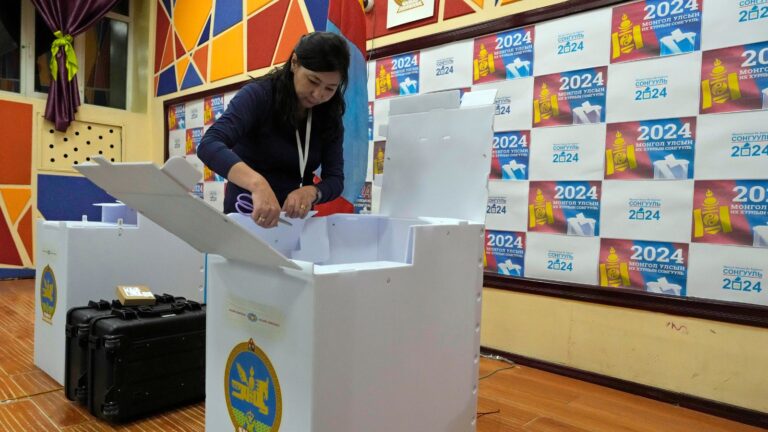Mongolia held parliamentary elections on Friday, with both old and new parties seeking to win the support of disillusioned young voters desperate for change.
Voting closed at 10pm in the vast but sparsely populated country, sandwiched between much larger autocracies China and Russia, with preliminary results expected by the early hours of Saturday.
At stake were 126 seats in the expanded parliament, 50 more than in the last elections in 2020, in which the Mongolian People’s Party won a landslide victory. The ruling party still appears to have the upper hand, but other parties could take advantage of voter discontent and erode its majority.
By midnight, about 88% of votes had been counted, with the People’s Party leading. The main opposition Democrat Party appeared to be performing better than in the previous election.
About two dozen voters lined up on the steps leading to a polling station on the outskirts of Ulaanbaatar in the early hours of the morning, some complaining that the station had opened 10 minutes late. Some older voters, including community leaders, wore formal silk robes with large leather belts for the occasion.
Once inside, voters filled out their ballots behind a small screen and fed them into an electronic vote-tallying machine. Before they left, a purple dot was made on their finger with a marker to prevent them from voting again.
As of 10 p.m., when polling stations closed, turnout was 69.3%, and is expected to reach 70% once results from remote elections are confirmed and overseas votes are included.
Mongolia, a country of 3.4 million people, became a democracy in 1990 after more than six decades of communist rule. While people have welcomed the freedoms that came with the end of communism, many remain skeptical of the parliament and its members, who they see as acting mainly in their own interests and those of their business associates.
The Mongolian People’s Party is aware of these problems but primarily blames other parties.
Prime Minister Oyun-Erdene Luvsanamsulay said on Friday that trust in democracy and parliament weakens when personal interests take precedence over the interests of the nation. He called for opening a new page in cooperation between the government and the people after the first 30 years of democracy.
“Today marks the beginning of a whole new 30 years in Mongolian history,” he told reporters after the vote. “Let’s all wait and see how this representative assembly functions and how the political parties operate.”
The polling station on the outskirts of Ulaanbaatar was in a “ger” area, where many people first lived in nomadic tents after migrating to the capital. The ger area remains poor, today made up mainly of simple houses, some of whom still live in tents in their yards. Many ger residents, especially the elderly, support the People’s Party, which ruled the country during communism before morphing into a center-left party during the democratic era.
Naranchimeg Ramjav, a 69-year-old People’s Party member and leader of the elderly community, was one of six fully-dressed voters who showed up at the polling station before the votes were scheduled to be counted at 7 a.m.
“I support the current government led by Prime Minister Oyun-Erdene because they have established justice and are starting a new era of 30 years,” she said, wearing an embroidered blue robe. But some younger voters expressed disappointment with the CPP and said they chose a younger candidate in the hope that he would bring about change.
Enkmandak Boldbaatar, 38, said he did not vote for either the People’s Party or the main opposition Democrat Party because they performed poorly in the election. Nineteen parties are vying for seats in parliament.
“I’ve lived here for 38 years and this area is the same,” he said. “Just this road and a few buildings were built. If it had worked for the people, things would have been different.”
Corruption scandals have undermined trust in the government and political parties, with the centre-right Democratic Party and the HUN Party emerging as a third major player in the elections.
Alongside corruption, which is a major issue for voters, the coronavirus pandemic and the war in Ukraine have destabilised the economy, raising unemployment and inflation, while the country has also been hit this year by a combination of severe weather and drought known as dzud, which has killed 7.1 million livestock.
Climate change and access to water in a water-scarce country weighs heavily on the minds of many nomadic herders like Kanda Byamba, 37, who lives in Dundgobi province in Mongolia’s Gobi Desert.
She told The Associated Press in an online interview that the candidates had promised to bring water to the region, where nomads and mines compete for scarce groundwater – both mainstays of Mongolia’s economy.
“Global warming and climate change are serious in Mongolia. The Gobi Desert is suffering from severe water shortages. I highly doubt they will deliver on their promises,” she said.

